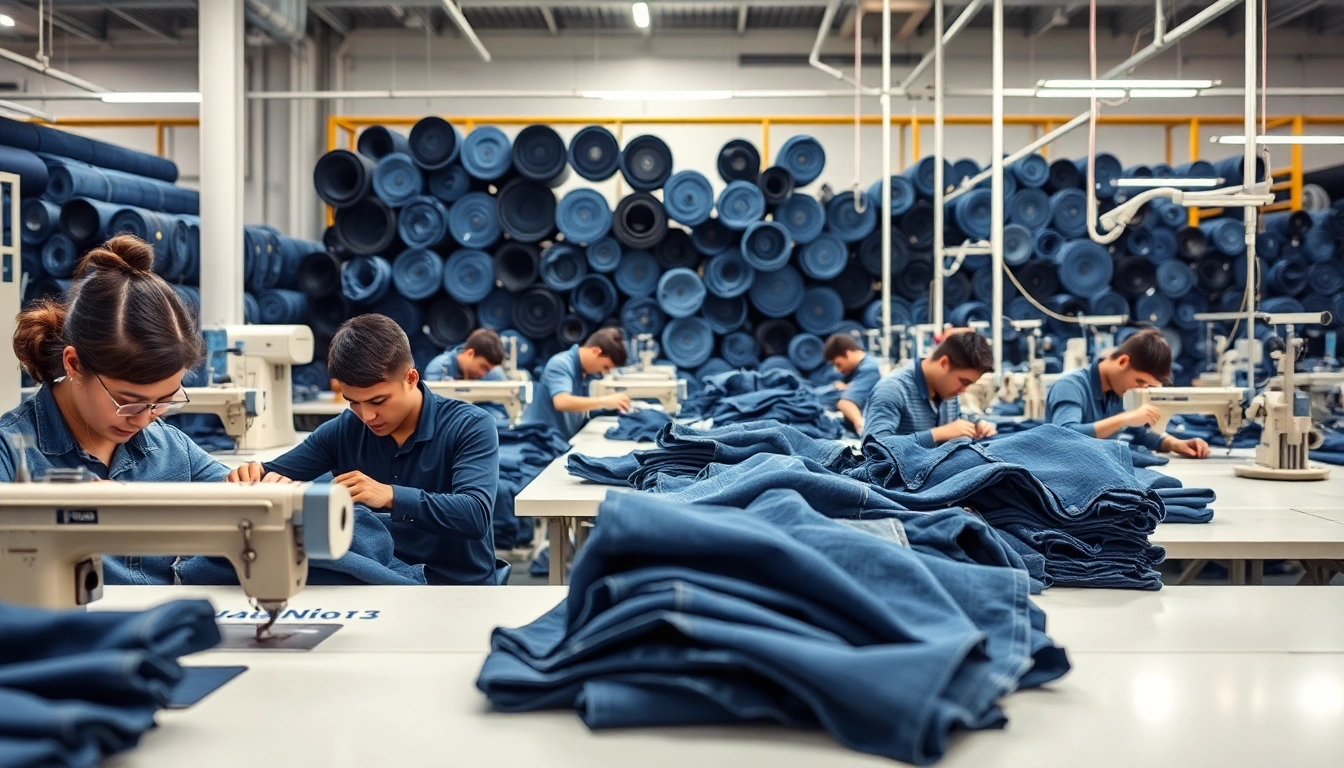Understanding the Role of Jeans Factory Manufacturers
The global denim industry is a massive market, with jeans being one of the most ubiquitous garments worldwide. With such a high demand for quality denim, understanding the intricacies of jeans factory manufacturers becomes crucial for brands aiming to succeed in this competitive arena. The role of manufacturers extends beyond mere production; they are vital partners in brand storytelling, consumer experience, and market strategy.
Overview of Denim Manufacturing Processes
The denim manufacturing process consists of several stages, each critical to the final quality of the jeans. It begins with fiber extraction—traditional cotton, synthetic blends, or alternative materials like Tencel can be utilized. Next comes the spinning stage, where fibers are spun into yarn. This yarn then undergoes dyeing, typically using indigo dye for the classic blue denim look.
After dyeing, the weaving process transforms the yarn into fabric through techniques such as twill weaving, known for producing the iconic diagonal ribbing of denim. This fabric is then cut into pieces according to patterns, and the assembly phase begins. During assembly, pieces are sewn together, and finishes like distressing or washing enhance the garment’s appeal. The final stages include quality control checks and packaging before distribution.
Key Considerations for Selecting Manufacturers
Choosing the right jeans factory manufacturer encompasses several important considerations:
- Capacity and Scalability: Assess whether the manufacturer can meet your production needs and scale with your growing demands.
- Quality Assurance: Look for manufacturers with established quality control processes to maintain standards.
- Technology and Innovation: Determine if the manufacturer employs modern technology and innovative practices that improve efficiency and product quality.
- Communication: Establish a clear line of communication. A manufacturer that listens to your needs and provides advice on best practices is invaluable.
The Impact of Quality on Brand Success
The quality of jeans produced is directly linked to brand reputation and consumer satisfaction. High-quality denim is characterized by durability, comfort, and aesthetic appeal. Brands must take a proactive approach in selecting manufacturers who prioritize quality at every stage of production. This results not only in fewer return issues but also fosters customer loyalty, encouraging repeat purchases.
Quality does not only pertain to the physical aspects of the jeans; it also includes ethical manufacturing practices. Consumers today are more conscious of where and how their clothes are made, making it essential for brands to align with manufacturers that engage in sustainable practices, thus enhancing their brand image.
Evaluating the Capabilities of Jeans Factory Manufacturers
Once you have established the importance of partnering with reliable manufacturers, the next step is to evaluate their capabilities. Understanding their technical expertise, production capacity, and quality assurance practices will help you make informed choices that align with your brand’s goals.
Assessing Technical Expertise and Equipment
The technical expertise of a manufacturer can often be gauged by the equipment and machinery they utilize. Advanced equipment can facilitate complex designs, enhance production speed, and ensure consistent quality. Brands should visit facilities where possible or request detailed descriptions of the manufacturing process, including the types of machines used.
Additionally, a manufacturer’s technical capabilities extend to their understanding of various fabric types, cutting-edge dyeing techniques, and sewing methods. This knowledge is essential for producing the intricate styles and finishes that modern consumers desire.
Understanding Production Capacity and Scalability
Establishing a robust production capacity is vital for fulfilling orders efficiently. Factors such as workforce size, machinery availability, and operational hours contribute to a manufacturer’s ability to meet demand. Brands should inquire about the manufacturer’s capacity to handle large orders and their strategies for scaling production as business grows.
Flexibility in scaling is particularly important for brands that may experience seasonal spikes in demand. Manufacturers that can easily adjust their output can help brands avoid missed opportunities during peak sales periods.
Quality Assurance and Control Practices
Quality assurance (QA) is at the heart of successful manufacturing. Brands need to ensure their manufacturers have structured QA processes to catch defects early and maintain consistent standards. Key components of quality control in the denim production process include batch testing for fabric strength, accuracy in cutting patterns, and inspection during assembly.
Regular audits and the use of established quality benchmarks can help sustain production integrity. Brands should also seek to understand how manufacturers respond to quality issues, including their willingness to take corrective actions swiftly.
Cost Factors and Pricing Models in Jeans Manufacturing
Cost considerations are essential when partnering with jeans factory manufacturers. Understanding the different pricing models, minimum order quantities, and potential hidden costs can safeguard brands against unforeseen financial strains.
Understanding Minimum Order Quantity (MOQ) Requirements
Minimum Order Quantity (MOQ) is a critical starting point in discussions with jeans factory manufacturers. MOQs can vary significantly from one manufacturer to another, depending on their operational model and capacity. Brands should assess their budget, market positioning, and anticipated sales volume to determine an appropriate MOQ for their needs.
Lower MOQs can sometimes mean higher prices per unit, but can be beneficial for startups testing the market. Conversely, large orders often yield discounts, but require careful forecasting to avoid overproducing or creating excess inventory.
Analyzing Pricing Structures and Hidden Costs
The pricing structure for denim manufacturing can be complex. Brands need to carefully analyze the costs associated with production, including fabric, labor, shipping, and additional services like marketing or design. Hidden costs such as tariffs, custom fees, or unexpected alterations can quickly escalate the initial budget.
To avoid surprises, it’s vital to ensure transparency in pricing discussions with manufacturers. Clear contracts that outline costs and payment terms can provide a framework for accountability.
Best Practices for Budgeting and Cost Management
Effective budgeting starts with a detailed understanding of all costs involved in manufacturing. Brands should consider establishing a comprehensive budget plan that includes production, marketing, and distribution costs. Implementing cost management practices, such as tracking expenses and analyzing variances against the budget, can also help ensure financial health.
Regularly reviewing and adjusting budgets in response to sales patterns allows brands to deploy resources efficiently and maximize profits. Setting aside contingency funds for unexpected costs can further safeguard against potential financial pitfalls.
Trending Innovations in Denim and Jeans Manufacturing
The denim industry is increasingly embracing innovations that enhance sustainability, efficiency, and consumer satisfaction. These trends create new opportunities for brands to differentiate themselves in a crowded marketplace.
Eco-friendly Practices in Denim Production
Eco-friendliness has moved from a trend to a necessity in the fashion industry. Fabrics can be sourced from organic or recycled materials, and manufacturers are increasingly employing processes that minimize water usage and chemical waste. Innovations like laser technology for distressing jeans reduce water and labor costs, leading to a more environmentally responsible approach.
Brands prioritizing eco-friendly practices can enhance their appeal to environmentally-conscious consumers, thus positioning themselves competitively in the market.
Technology Integration in Manufacturing Processes
Technology’s role in manufacturing continues to evolve. From advanced software that manages inventory and order tracking to automated cutting machines that increase precision, brands that integrate innovative technologies can streamline their operations effectively. Lessons from other industries, such as automotive and electronics, are often applicable and help to build better manufacturing processes for denim.
Embracing technology not only enhances production efficiency but can also improve data analytics capabilities, giving brands profound insights into consumer preferences and market trends.
Customization Trends and Consumer Preferences
As consumer preferences shift towards personalized shopping experiences, the demand for customized jeans has surged. Brands are exploring options that allow customers to select fits, styles, and tailored finishes. Manufacturers that can accommodate these customizations efficiently stand to gain a competitive edge.
This growing trend requires manufacturers to be flexible and responsive, adapting their production processes to sell more bespoke products without sacrificing quality or increasing lead times.
Building Strong Partnerships with Jeans Factory Manufacturers
Developing strong relationships with jeans factory manufacturers is essential for long-term success. Collaborative efforts can lead to innovative solutions, improved efficiency, and enhanced product quality, forming a symbiotic relationship that benefits both parties.
Effective Communication and Collaboration Strategies
Establishing effective communication begins with clarity in expectations. Regular meetings, shared digital platforms for updates, and an open-door policy for addressing concerns are all effective strategies for enhancing collaboration. Utilizing modern communication tools and technologies can facilitate real-time feedback and updates on production progress.
Brands should also prioritize cultivating a culture of partnership, where manufacturers feel valued and engaged in the brand’s journey. This trust can lead to better outcomes in production and product innovation.
Long-term Relationship Management
Building long-lasting relationships with manufacturers requires ongoing investment in the partnership. Frequent evaluations of performance, open lines of communication, and opportunities for training or capability development can strengthen these relationships. Formal agreements often set the stage for mutual goals, creating alignment in vision and expectations.
Moreover, having a backup plan and diversifying suppliers can provide resilience in the face of unforeseen challenges, ensuring that your brand remains competitive in the market.
Measuring Success and Performance Metrics
Finally, measuring the success of your partnership with jeans factory manufacturers involves identifying and tracking key performance indicators (KPIs). Metrics such as on-time delivery rates, defect rates, and overall quality ratings can provide insights into the effectiveness of the partnership.
Regularly reviewing these metrics not only helps in assessing performance but also highlights areas for growth and improvement, allowing brands to maintain high standards in their product offerings.



